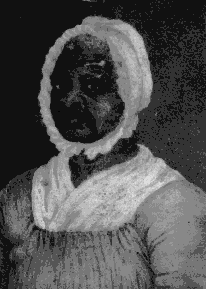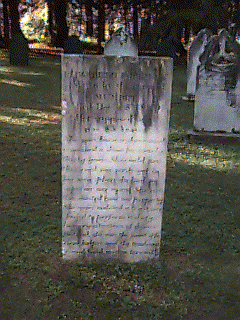

From "Sheffield, Frontier Town" by Lillian E. Preiss
-page 47 - 49....the citizens of Massachusetts had been concerned with their own state constitution, which was adopted in 1780 and contained many of the features later incorporated into the United States Constitution and the Bill of Rights. Since Colonel Ashley was a prominent lawyer and an influential Southern Berkshire resident, it was only natural that his home would be the scene of many discussions about the document. In his household there was a young slave woman, affectionately called Mumbet, who, with her sister Lizzie, had been purchased as a child from Mrs. Ashley's family, the Hogabooms of Claverack, New York. As she waited on the Ashley family, Mumbet overheard many of the conversations about freedom and liberty.
One day in a fit of anger Mrs. Ashley was about to strike the younger girl with a heated shovel. Stepping between the two, Mumbet received the blow intended for her sister; then, resentful of the injustice, she left the house. Persuading a fellow slave named Brom to join her, she hastened to the home of Theodore Sedgwick, Sheffield's leading lawyer and a friend of Colonel Ashley's. There they sought his assistance in obtaining their freedom. In answer to Sedgwick's question about how she ever got such an idea, she replied that in listening to the talk about the Bill of Rights, "she never heard but that all people were born free and equal, and she thought long about it, and resolved she would try whether she did not come among them."
Intrigued by the "palpable illogic of slavery at a time when Massachusetts was engaged in a fight for freedom from imperial regulation and control," Sedgwick accepted the case. The suit for freedom of the two slaves, Brom and Bett vs. Ashley, was heard in August 1781 before the County Court of Common Pleas in Great Barrington. Colonel Ashley pleaded that the Negroes were his legal servants for life, but the plaintiffs, represented by Sedgwick and Tapping Reeve, a distinguished lawyer of Litchfield, Connecticut, won their case. The jury found that the Negroes were freemen illegally detained in servitude by the Ashleys and assessed damages of thirty shillings against the defendants. Mumbet was awarded compensation for her services from the time she was twenty-one years of age. Ashley decided to withdraw the appeal, for he was still tainted by the opprobrium clinging to him as one of the "obnoxious seventeen" rescinders of 1789.
Welcomed cordially into the Sedgwick family, Mumbet, taking the surname of "Freeman", remained with the Sedgwicks for the rest of her life as a beloved friend and helper. Catherine Sedgwick, late a popular novelist, wrote of her: "One should have known this remarkable woman, the native majesty of her deportment . . . Mumbet was the only person who could tranquilize my mother when her mind was disordered - the only one of her friends whom she liked to have about her - and why? She treated her with the same respect she did when she was sane. As far as possible, she obeyed her commands and humored her caprices; in short, her superior instincts hit upon the mode of treatment that science has since adopted."
When Mumbet died in 1829, she was buried in the Sedgwick plot in Stockbridge near the center of the family circle. Her epitaph, written by Charles Sedgwick, reads: "She was born a slave and remained a slave for nearly thirty years. She could neither read nor write, yet in her own sphere she had no superior nor equal. She neither wasted time nor property. She never violated a trust, nor failed to perform a duty. In every situation of domestic trial, she was the most efficient helper, and the tenderest friend. Good Mother, farewell." Mumbet's case was one of the most important in a series of slave cases in 1781 which led to the abolition of slavery in Massachusetts.

Mumbet: Folklore and Fact by Arthur Zilversmit- article in Berkshire History, Spring 1971, Vol. I, No. 1.
The Ashleys - A Pioneer Berkshire Family by Arthur C. Chase- booklet published for the Colonel Ashley House